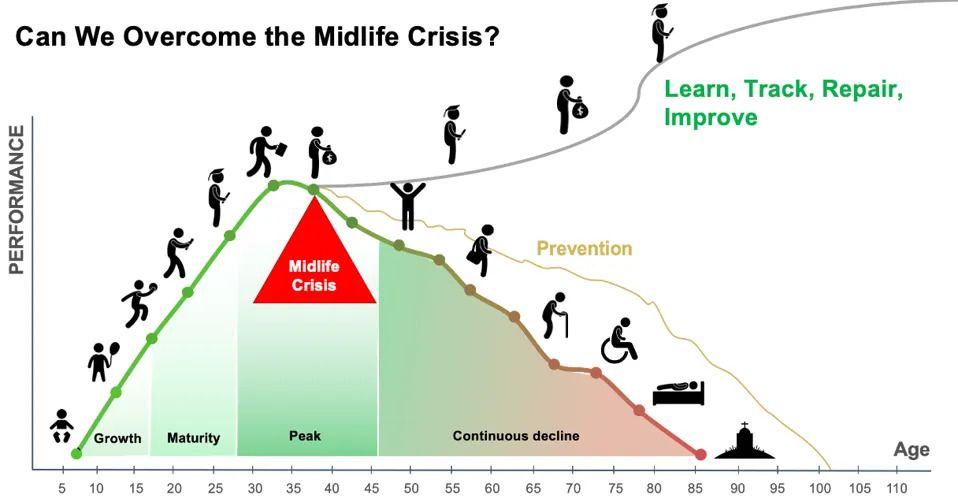Some days, life simply finds you. One minute you’re busy enjoying life, and the next night you’re looking at the center of the ceiling, wondering: What have I really done with my life?
All of the things that made you proud—your work, your achievements, your sense of identity—are now under question. It’s not just a sudden urge to buy a motorcycle or take up some wild hobby; it’s a slow-burning fire of self-reflection and self-doubt that can feel like an emotional whirlwind.
So, what is midlife crisis all about?
Let’s dig into it and show how you can come out on the other side feeling more in control and less like you’re just going through the motions.
Table of Contents
What is a Male Midlife Crisis?
Men’s midlife transition is not a joke, first of all.
Men go through a very real psychological phenomenon, usually around their 40s and 50s. That disturbing knowledge that life may be half over and the accompanying quick, creeping sense of unhappiness.
You ask suddenly: Was my youth wasted? Was my hunt after the wrong dreams?
This is a turning moment in your life when you either start searching for fresh approaches to redefine it or hang on to your present road.

For some, this looks like impulsive behavior: sudden job changes, switching careers, drastic changes in appearance, or even leaving relationships.
But for most, a male midlife crisis is an inner confusion, a kind of quiet storm where they battle against feelings of regret, loss of purpose, and the burdening sensation that they’re running out of time.
Personal story: I once got to know a man in his early 50s called Mark. Years of working the same corporate job had left him somewhat lost. One day he discovered some old painting supplies from his childhood while sorting his attic. It set off his memories and he considered, “Why not try it?” Painting once more improved things for him greatly. Making art brought him happiness, but it also enabled him to reestablish relations to friends and relatives. Mark’s story demonstrates how you may rediscover what makes you feel alive despite a male midlife crisis.
What Causes Male Midlife Crisis?
Next graph illustrates searches trend for “Male midlife crisis” in last 5 years.

We can see an upward trend every now and then.
Now, why does this happen? It’s not just that men are getting older.
Midlife crisis in men stems from deeper emotional and psychological factors. When you hit a certain age, several things come crashing down at once:
- Mortality: The thought of aging becomes more tangible. You’re not immortal; you’re human. Those wrinkles, gray hairs, and the occasional ache serve as reminders that you’re on a clock.
- Career and success: By midlife, many men have been in the same profession for a while. You might have climbed the corporate ladder or built a solid career. But has it been worth it? A common question emerges: Is this all there is?
- Family and relationships: Your kids are likely grown or growing fast. Maybe you’ve devoted decades to raising them. Now, they don’t need you the same way. That extra time can feel like a void. If your marriage or relationship feels stale, this only intensifies the crisis.
- Unfulfilled dreams: At some point, you wanted to start a business, travel the world, or write that novel. The sudden realization that time is ticking creates panic. You begin to obsess over unfulfilled dreams over what you haven’t done.
These factors converge into a perfect storm, leaving you feeling as though the life you’ve built isn’t the meaningful life you truly want. Or worse, you’re left feeling like you didn’t live up to your own potential.
Check out this great video by psychotherapist Marios Georgiou explaining in details what midlife crisis is.
Symptoms of Male Midlife Crisis: How to Tell
Though every emotional shakedown appears different, there are several typical indicators that could alert you of a middle aged man crisis:
- Restlessness: Since you feel uncomfortable in your own flesh, you are not sure what is wrong—you are experiencing midlife anxiety. Something is wrong in your personal life as well as in your employment, and there may be unhappiness.
- Obsessing over the past: You find yourself thinking about your youth more often, considering the things you missed. High school athletics, college selections, that ideal career—your imagination is consumed with “what could have been.”
- Impulse to change: There is an instantaneous, strong need to make significant changes in life. You might want to quit your job, sell your house, or move to another country. You’re craving something, anything, to shake up your world.
- Looking more at how you look: Putting more priority to your looks is completely normal. You feel an urge for a change and therefore you start working out, dye your hair or buy skin care anti-age products.
- Putting yourself against others: You start to remember what your friends and family have done and feel like you’ve not done as well. That businessman from school? He seems to have everything under control, but you’re helpless.
- Mood swings: For a moment, everything is fine. The next thing you know, you’re unhappy, stressed, or angry. It makes you feel like you’re on a mental seesaw.
- Wondering what you’re meant to do: There are times when you might wonder if the time and effort you’ve put into your job or relationships has been worthwhile. What’s going on? Every day you find yourself wondering what life is all about.
Dr. Daniel Levinson, a prominent psychologist known for his work on adult development, highlights these changes: “During a midlife crisis, individuals often grapple with feelings of dissatisfaction and loss. They might impulsively alter their life circumstances in an attempt to reclaim a sense of youth or vitality. This period can be marked by significant stress and uncertainty, affecting various aspects of their life.”
Understanding these factors will help you to determine if someone is in a normal period of life or if they may need additional help.

Note: Approaching this stage with empathy is essential as, while it may be difficult, if the correct actions are followed, it can also be a period of development.
Male Midlife Crisis vs. Depression: Differences
A midlife crisis in men and depression must be distinguished even if there is some overlap.
Even though both include sadness or unhappiness, a man’s midlife psychological struggle (crisis) is generally marked by greater spiritual thought or a desire to change. On the other hand, depression is a common mental disease marked by chronic sadness, tiredness, and hopelessness.
Here’s how they compare:
| Depression | Midlife Crisis |
|---|---|
| Persistent sadness or low mood | Restlessness and dissatisfaction |
| Loss of interest in activities once enjoyed | Sudden desire to make life changes |
| Fatigue and lack of energy | Impulse to switch careers or lifestyle |
| Feelings of worthlessness or guilt | Questioning past decisions or life choices |
| Difficulty concentrating | Obsessing over lost opportunities |
| Changes in sleep patterns (insomnia or excessive sleep) | Increased focus on appearance or physical fitness |
| Thoughts of death or suicide | Fear of aging and regrets about time passing |
| Weight gain or loss | Desire to recapture youth or past passions |
| Lack of motivation or apathy | Reevaluating long-term relationships |
| Sense of hopelessness about the future | Searching for meaning in midlife |
As you can see, depression and a midlife crisis can be related, but they’re not the same thing.

If depression lasts for a long time, most people need medical help. A midlife crisis, on the contrary, is generally just a short time to think about things and make changes.
It is important to get professional help if you or someone you know is dealing with long-term sadness, lack of motivation, or suicide thoughts.
Are Midlife Crises Long-lasting?
One of the burning questions many men have during a midlife crisis is, How long is this going to last?

Unfortunately, there is no one-sized solution. One man to the next, the length might range greatly. Some people only experience a transient period, a few months of off-kilter sensation. For some, it might last many years, similar to an emotional rollercoaster.
It depends on personal circumstances including:
- Crisis severity: Not every midlife crisis is exactly the same. Some find it a little existential trip, a few weeks of restlessness. Others find it a deeper emotional journey that calls for more time and effort to negotiate.
- Life circumstances: What’s happening in your world plays a huge role. Big life changes—like a divorce, a new job, or health scares—can amp up the intensity of a midlife identity crisis and make it last longer. If you’re juggling multiple stressors, it’s no wonder the crisis feels like it’s dragging on.
- Support system: If you’ve got a solid support network—friends, family, or a counselor—you might sail through this stage more quickly. Having someone to talk to can make all the difference. On the flip side, feeling isolated can stretch out the process.
- Personal reflection and action: The key to moving past a midlife crisis isn’t just sitting back and waiting for it to pass. It’s about engaging with your feelings and actively addressing the questions it raises. Men who decide to reevaluate their goals, make good changes, or ask for help often get through the problem more quickly. Do you ignore the signs or try to push them down? That could make it last longer.
Others may go through a midlife crisis for five years or more, while others go through it and get back on their feet in about a year.

Recall that this is more like a marathon than a sprint. It takes as long as it needs to; no “right” schedule exists. It all comes down to your approach to the matter and the actions you follow to straighten your life.
How to Survive a Midlife Crisis Without Going Crazy
Then, what should one do when caught in the man’s second adulthood? Is it from here all downhill? Not at all.
Actually, this phase of your life might provide chances for significant transformation.
Here are some helpful tips to go through it:
Recognize your emotions
The first step is realizing you are experiencing emotional midlife upheaval. Tell yourself it’s just a phase and ignore your feelings; put them aside.

Understanding the pain is the first step in moving forward.
Ask someone
Whether it’s a therapist, friend, or boyfriend, honest communication about your emotions may help release some of the inner strain.
Talk to them, tell them how you feel and that you think you are going through some unknown period of life for you.
You are not alone; they might provide some viewpoints you didn’t think about.
Review your objectives
A crisis in midlife does not mean failure. Look in the future rather than complaining about your weaknesses. What are some reasonable objectives you can develop?

Whether your interests are in a new activity, a different line of work, or just bettering your health, concentrate on doable actions.
Take care of your body
Periods of emotional struggle may cause physical health to suffer. Make sure that you are eating healthy, being active, and getting enough sleep. Even small changes to your daily schedule could significantly improve your attitude.
Don’t make snap choices
Avoid making judgements quickly, even if you feel like you need to change everything about your life. You should take your time to consider your actions.

Life-changing choices shouldn’t be made in a rage; they should be thought out carefully.
Practice thanks
While it seems corny, this works. Reflecting on what is good in your life—your relationships, your successes, your health—helps you balance the unpleasant emotions often accompanying a midlife crisis.
Accept change
Try to welcome rather than fight the reality that your life is changing. Not always a negative thing is change. Sometimes it’s just what you need to get you into a more content second half of life.

Personal anecdote: One of my neighbors went through a tough midlife crisis, but he didn’t even realize it at first. He’d come home every day, frustrated and angry, questioning all his life decisions, which gradually spiraled into something like depression. If it hadn’t been for his family, who knows what might’ve happened? They helped him see the positives in his life—his achievements, his family, and how blessed he really was. Sometimes we lose sight of those things while chasing material success.
Can a Marriage Survive Male Midlife Crisis?
Yes, a marriage can survive a male midlife crisis, but it takes understanding, patience, and empathy.
Watching your spouse go through the challenges of aging can be tough. You might not fully understand why they’re suddenly restless or unhappy, or why they’re making impulsive decisions.

One may easily get annoyed or even rejectingly irritated. But if you want your marriage to survive, you must address the matter objectively.
You may help someone going through a life reevaluation as follows:
- Don’t criticize them: Sometimes they just need to let off steam. Let them discuss free from theories or assistance they have not asked for. Even if you cannot relate to every feeling someone is experiencing, being present and attentive may be very helpful.
- Encourage professional help: If the crisis appears a little to much or is causing destructive behavior, kindly consult them to visit a counselor or therapist. Expert advice may help individuals go through their feelings and pinpoint constructive coping mechanisms.
- Provide comfort: Midlife emotional struggles sometimes result in self-doubt or remorse. Tell your loved one about their qualities, prior achievements, and the good things in their life. They only need to be reminded sometimes that they have done well.
- Don’t take it personally: When someone close to you appears unhappy or distant, it’s easy to feel as if you are responsible. Remember, however, that this crisis is about their inner conflict rather than necessarily their connection with you. Allow them space, but also let them know you are there to provide encouragement.
- Support positive changes: Whether they are looking for a new hobby, exercise program, or professional path—whatever it is—offer your help. Encouragement of good, constructive outlets helps individuals properly direct their emotions.
- Patience is the key: A crisis in midlife could last months or even years. It is not a short fix. Therefore, even if being engaged is crucial, do not anticipate instant outcomes. Your help may provide a basis of stability as they negotiate this stormy period.
Conclusion
Relationship between men and midlife crisis can be a little overwhelming, not only for the person experiencing it but for the people surrounding him too.
However, with a lot of understanding and conversation, this can be handled and also lead to a period of personal growth.
Spotting the signs and offering support can make a big difference in tackling this male midlife crossroad and regaining a sense of direction. The psychological shift that comes with this phase can be difficult, but it’s typically temporary.
Many men emerge from their midlife reassessment with newfound clarity and self-reflection.
If you find these signs in your behavior or someone else’s, please don’t hesitate to reach out.
Talk to a trusted friend or a mental health professional, because it can help you fix midlife anxiety and lead to a better understanding of this midlife turmoil.